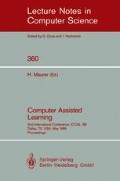Abstract
Despite the appearance of more and more software packages for micro-computers designed to be used to improve the teaching/learning of introductory college mathematics courses including calculus, the acceptance and use of these packages as a regular part of the instructional paradigm is limited. The fact appears to be that we as yet do not know how to use them in mathematics education except as ad hoc add-ons to the course, simply because the relation between the subject matter and the software is unclear. The present paper is an attempt to provide the missing conceptual links between the topics, entities, operations, and problems treated in the texts, and the syntax and semantics of the software, to make the latter immediately understandable and therefore useable by student and teacher alike. In our view, there should be nothing extraneous to learn. To this end we adopt an object-oriented approach, the object-types being the mathematical objects themselves, and the actions being familiar mathematical operations on these objects. Next, we provide a modifiable tree-structure of menus of objects and actions as interface to the user to give flexibility. Lastly, we introduce "task descriptions" to guide, direct, record and communicate mathematical activities carried out by the student at the computer. We restrict ourselves here primarily to a discussion of object-types and actions, and the interface used, and illustrate with a prototype package for much of introductory calculus.
Preview
Unable to display preview. Download preview PDF.
References
PC-MATLAB: The Math Works Inc., Portola Valley, CA 94025
MATH-CAD: Math Soft Inc., 1 Kendall Square, Cambridge, MA 02139
DERIVE, A Mathematical Assistant, Soft Warehouse Inc., Honolulu, Hawaii
MATHEMATICA: A System For Doing Mathematics By Computer, Steve Wolfram, Addison Wesley, 1988
J.G. Kemeny in The Future of College Mathematics, A. Ralston and G. Young, editors, Springer, 1983
B.W. Char and K.O. Geddes, Computer Algebra in the Undergraduate Mathematics Classroom, Communications of the ACM, 1986, p. 135
A. Ralston in The Future of College Mathematics, ibid.
Adele Goldberg, Small Talk-80, The Language and Its Implementation, Addison-Wesley, 1984
G.A. Pascoe, The Elements of Object-Oriented Programming, Byte, Vol. 11, August 1986, pp. 139–144
J.A. Zimmer, Abstraction For Programmers, McGraw-Hill, 1987
MicroCALC, 1987, Harley Flanders, MathCalcEduc, 1449 Covington Drive, Ann Arbor, MI 48103
CALCULUS: True BASIC Math Series, J. Kemeny and T. Kurtz, TBI, 39 South Main St., Hanover, N.H. 03755
Author information
Authors and Affiliations
Editor information
Rights and permissions
Copyright information
© 1989 Springer-Verlag Berlin Heidelberg
About this paper
Cite this paper
Greenberg, H.J., Pengelly, R.M. (1989). A conceptual basis for the role of the micro-computer in the teaching/learning of college mathematics. In: Maurer, H. (eds) Computer Assisted Learning. ICCAL 1989. Lecture Notes in Computer Science, vol 360. Springer, Berlin, Heidelberg. https://doi.org/10.1007/3-540-51142-3_56
Download citation
DOI: https://doi.org/10.1007/3-540-51142-3_56
Published:
Publisher Name: Springer, Berlin, Heidelberg
Print ISBN: 978-3-540-51142-7
Online ISBN: 978-3-540-46163-0
eBook Packages: Springer Book Archive

